At long last, it’s time to continue our tribute to excellent Genesis soundtracks with ten more games that demonstrate truly top-notch musical effort. We’ll give a summary of what makes these compositions stand out from the rest, as well as the best tracks from each album. Please keep in mind that this is in no way a top ten list – it’s merely a formal recognition of aural excellence. No soundtrack on this list can be placed above another objectively, so just sit back and enjoy them all. That shouldn’t be too much of a chore.
Comix Zone
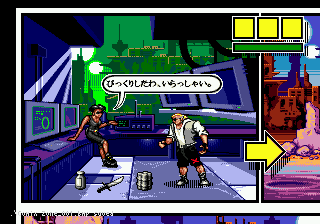 This game has all the technical prowess you would expect with such a late release, and certainly sets a benchmark for quality of sound. All the music and voice samples are razor-sharp, from the Elvis impersonator at the SEGA screen to Sketch’s quips to the intermission scenes. Sega Technical Institute didn’t disappoint us when it came to pushing the Genesis’ envelope, that’s for sure. But what’s great is that the actual compositions are deserving of the effort that went into presenting them. It’s all rock ‘n roll here – a fittingly American soundtrack for a game so closely linked to comic books. Chugging rhythm synth backs up some screaming melodies that match the fierce martial-arts combat perfectly. I can’t imagine how anyone could criticize the appropriateness of the tunes here, and – although I doubt many people instantly think of great music when they think of Comix Zone – the package would certainly not be as complete without the strident rock soundtrack. We all should thank Howard Drossin for his work.
This game has all the technical prowess you would expect with such a late release, and certainly sets a benchmark for quality of sound. All the music and voice samples are razor-sharp, from the Elvis impersonator at the SEGA screen to Sketch’s quips to the intermission scenes. Sega Technical Institute didn’t disappoint us when it came to pushing the Genesis’ envelope, that’s for sure. But what’s great is that the actual compositions are deserving of the effort that went into presenting them. It’s all rock ‘n roll here – a fittingly American soundtrack for a game so closely linked to comic books. Chugging rhythm synth backs up some screaming melodies that match the fierce martial-arts combat perfectly. I can’t imagine how anyone could criticize the appropriateness of the tunes here, and – although I doubt many people instantly think of great music when they think of Comix Zone – the package would certainly not be as complete without the strident rock soundtrack. We all should thank Howard Drossin for his work.
Tracks to check out: 1, 14, 17, 20
Golden Axe
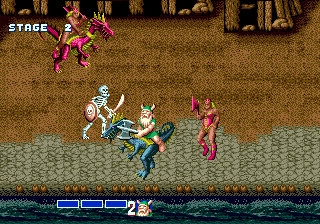 This game was the closest thing to a killer app the Genesis had until the arrival of Sonic, and a killer app needs a killer soundtrack, of course. The epitome of Conan-inspired ‘80s medieval soundtracks, Golden Axe‘s score is a fresh combination of tribal beat and adventuresome themes. As we’ve seen before, there’s a lonely feel to the compositions – fitting for a story about a trio of vengeance-bent heroes setting out against a huge army. And thanks to some sticky melodies there’s no telling how long it’ll be before these songs finally get out of your brain. In the meantime, sit back and let the score enhance that hack ‘n slash experience, then smile at the total reversal of style found in the credit track. Even then, it’s not over yet: those with a hankering for more of the same goodness should check out Megadriver‘s remix of the main theme. Just goes to show you that good tunes never die, no matter how badly Sega treats the franchise.
This game was the closest thing to a killer app the Genesis had until the arrival of Sonic, and a killer app needs a killer soundtrack, of course. The epitome of Conan-inspired ‘80s medieval soundtracks, Golden Axe‘s score is a fresh combination of tribal beat and adventuresome themes. As we’ve seen before, there’s a lonely feel to the compositions – fitting for a story about a trio of vengeance-bent heroes setting out against a huge army. And thanks to some sticky melodies there’s no telling how long it’ll be before these songs finally get out of your brain. In the meantime, sit back and let the score enhance that hack ‘n slash experience, then smile at the total reversal of style found in the credit track. Even then, it’s not over yet: those with a hankering for more of the same goodness should check out Megadriver‘s remix of the main theme. Just goes to show you that good tunes never die, no matter how badly Sega treats the franchise.
Tracks to check out: Wilderness; Fiend’s Path; Sukakora, Sassa!
Light Crusader
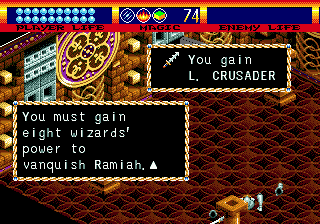 Ah, Light Crusader. Look up “mixed bag” in any self-respecting dictionary and you’ll find this game listed as the definition. Rarely do we see a game that sways from the brilliant to the banal so crazily as Treasure’s only RPG attempt. Even within the music category you have an almost ridiculous variance in quality. One moment you’re suffering through some of the most horrendous assemblages of synthesized notes ever to assault the human ear, and then… Then the next moment you’re being treated to marvelous arrangements with stupendously crafted melody and harmony. A wide range of synth instruments and snazzy stereo sound give this soundtrack a shove in the right direction, and the quirky nature of the compositions back up the level art well. The bad tracks are generally outweighed by the numerous good ones, and in the end this soundtrack is nudged into the hall of fame. Just watch out for falling quality here and there.
Ah, Light Crusader. Look up “mixed bag” in any self-respecting dictionary and you’ll find this game listed as the definition. Rarely do we see a game that sways from the brilliant to the banal so crazily as Treasure’s only RPG attempt. Even within the music category you have an almost ridiculous variance in quality. One moment you’re suffering through some of the most horrendous assemblages of synthesized notes ever to assault the human ear, and then… Then the next moment you’re being treated to marvelous arrangements with stupendously crafted melody and harmony. A wide range of synth instruments and snazzy stereo sound give this soundtrack a shove in the right direction, and the quirky nature of the compositions back up the level art well. The bad tracks are generally outweighed by the numerous good ones, and in the end this soundtrack is nudged into the hall of fame. Just watch out for falling quality here and there.
Tracks to check out: Not Available.
M.U.S.H.A.
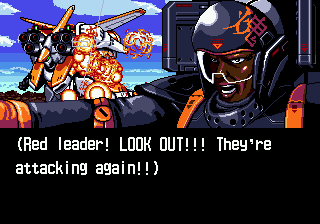 Fans know what to expect when they boot up this side story to the legendary Aleste series: frantic shmupping mayhem. Wave after wave of insane obstacles and enemies cascade down on you in increasingly rapid succession. There’s never a chance to breathe as you weave through tight patterns of enemy fire, and each boss battle is more intense than the one before. Why am I saying all of this? Because the soundtrack has the same frenetic properties. It’s a no-holds-barred score for a no-holds-barred vertical shooter, and — although seemingly impossible thanks to the already feverish opening — each track is faster and more furious than the one before it. When you put it all together you get a maddening crescendo of rhythm and metal that matches the onscreen brawl perfectly. What you have is a shooter soundtrack for the ages, and it’s partially thanks to this fusion of frenzied music and blistering action that M.U.S.H.A. lives on in the hearts of shump fans everywhere. It’s a work of art in its own right, and the only soundtrack that can possibly compete with it is Technosoft’s Lightning Force.
Fans know what to expect when they boot up this side story to the legendary Aleste series: frantic shmupping mayhem. Wave after wave of insane obstacles and enemies cascade down on you in increasingly rapid succession. There’s never a chance to breathe as you weave through tight patterns of enemy fire, and each boss battle is more intense than the one before. Why am I saying all of this? Because the soundtrack has the same frenetic properties. It’s a no-holds-barred score for a no-holds-barred vertical shooter, and — although seemingly impossible thanks to the already feverish opening — each track is faster and more furious than the one before it. When you put it all together you get a maddening crescendo of rhythm and metal that matches the onscreen brawl perfectly. What you have is a shooter soundtrack for the ages, and it’s partially thanks to this fusion of frenzied music and blistering action that M.U.S.H.A. lives on in the hearts of shump fans everywhere. It’s a work of art in its own right, and the only soundtrack that can possibly compete with it is Technosoft’s Lightning Force.
Tracks to check out: Galvanic Gear, Armed Armor, Aggressive Attack.
Rocket Knight Adventures
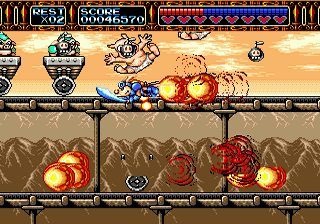 RKA is an acknowledged classic, one of the premiere titles in its genre, and at least some of this fame has to be due to the masterful relationship between the graphics and the score. They’re inextricably linked – without the cheery animations and whimsical art style the music would be laughably out of place; without the peppy soundtrack and excited rhythms the world of Rocket Knights would be stale and uninspired. But as it is, Konami has worked its magic once again with a spectacular marriage of sound and visuals. The soundtrack keeps in step with the rest of the game, but never forgets that, at its heart, RKA is a silly story about armor-wearing opossums fighting martial pigs. The songs that back this strange display never get full of themselves or try to inject more drama than is deserved, but at the same time there’s never a moment in which the music departs on an unmerited tangent of levity. And it’s that quality that makes this soundtrack truly one for our list.
RKA is an acknowledged classic, one of the premiere titles in its genre, and at least some of this fame has to be due to the masterful relationship between the graphics and the score. They’re inextricably linked – without the cheery animations and whimsical art style the music would be laughably out of place; without the peppy soundtrack and excited rhythms the world of Rocket Knights would be stale and uninspired. But as it is, Konami has worked its magic once again with a spectacular marriage of sound and visuals. The soundtrack keeps in step with the rest of the game, but never forgets that, at its heart, RKA is a silly story about armor-wearing opossums fighting martial pigs. The songs that back this strange display never get full of themselves or try to inject more drama than is deserved, but at the same time there’s never a moment in which the music departs on an unmerited tangent of levity. And it’s that quality that makes this soundtrack truly one for our list.
Tracks to check out: 02, 04, 10, 14
Sonic The Hedgehog 3 & Knuckles
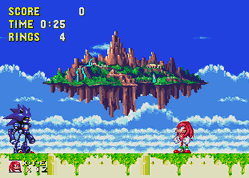 You knew this had to be coming, right? This game (two parts, one adventure) is the true climax of the original Sonic games, and as such it has fittingly dramatic music. The first Sonic soundtrack assuredly set a precedent for the hordes of hopeful clones that followed; the second built on the first with more sophistication; and this finale gives gamers the slickest presentation yet. In these two scores lie the truly enthralling melodies and sounds – the ones that will stick with you long, long after the adventure is complete. Tokuhiko “Bo” Uwabo and his Sega Sound Team really pulled out the stops here, and rumors have it that fundamental themes left over from a cancelled Michael Jackson soundtrack still live on in certain zones, like Ice Cap and Carnival Night. Regardless of who composed it, there’s no question that this is a legendary musical score.
You knew this had to be coming, right? This game (two parts, one adventure) is the true climax of the original Sonic games, and as such it has fittingly dramatic music. The first Sonic soundtrack assuredly set a precedent for the hordes of hopeful clones that followed; the second built on the first with more sophistication; and this finale gives gamers the slickest presentation yet. In these two scores lie the truly enthralling melodies and sounds – the ones that will stick with you long, long after the adventure is complete. Tokuhiko “Bo” Uwabo and his Sega Sound Team really pulled out the stops here, and rumors have it that fundamental themes left over from a cancelled Michael Jackson soundtrack still live on in certain zones, like Ice Cap and Carnival Night. Regardless of who composed it, there’s no question that this is a legendary musical score.
Tracks to check out: 0B, 13, 15, 26
Sparkster
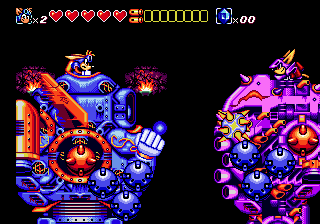 We just discussed the legend that is the first Rocket Knight game, and now its time for its successor to bask in some glory. In terms of gameplay, Sparkster falls far short of the original Rocket Knight Adventures, but luckily we don’t care about gameplay right now. All we care about is the music, and Sparkster actually excels in this category. The themes are all rich and well defined – each mirror the heroic spirit of a Rocket Knight admirably. It’s all swashbuckling stuff here, with a tinge of the foreboding added in for good measure. Solid material, to be sure, and in the final analysis it’s a crying shame that the overall game didn’t come together better. We’ll probably never know exactly why Konami dropped the ball, but at least we have a great soundtrack to listen to while we’re stuck in a funk.
We just discussed the legend that is the first Rocket Knight game, and now its time for its successor to bask in some glory. In terms of gameplay, Sparkster falls far short of the original Rocket Knight Adventures, but luckily we don’t care about gameplay right now. All we care about is the music, and Sparkster actually excels in this category. The themes are all rich and well defined – each mirror the heroic spirit of a Rocket Knight admirably. It’s all swashbuckling stuff here, with a tinge of the foreboding added in for good measure. Solid material, to be sure, and in the final analysis it’s a crying shame that the overall game didn’t come together better. We’ll probably never know exactly why Konami dropped the ball, but at least we have a great soundtrack to listen to while we’re stuck in a funk.
Tracks to check out: 90, 95, A2, A3
Super Hang-On
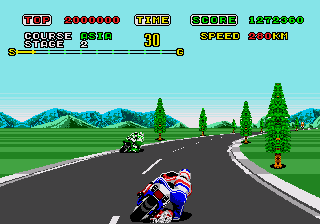 Quality over quantity is the key idea with this offering. Indeed, there are only eight tracks in the whole game! And although only four of those can be selected at the start of the race, you’ll soon find that picking one is one heck of a tough decision. Each encapsulates a different aspect of racing perfectly: the loneliness of an open highway, the adrenaline of close-quarters jockeying, the thrill of tearing across the finish line, the bitterness of a loss. The sound files aren’t technically advanced, but that’s forgivable since the game came out early in the Genesis’ life span. Besides, the melodies don’t need a bunch of hyped-up synthesis. They truly sing for themselves; it almost might be that their simplicity is a strong point, it’s a joy to hear such crisp, clean chords and melodies. It sounds strange to play a racing game for its music, but you might just find that those four songs are so good they outlast the gameplay. If that’s not a trait of good composition, I don’t know what is.
Quality over quantity is the key idea with this offering. Indeed, there are only eight tracks in the whole game! And although only four of those can be selected at the start of the race, you’ll soon find that picking one is one heck of a tough decision. Each encapsulates a different aspect of racing perfectly: the loneliness of an open highway, the adrenaline of close-quarters jockeying, the thrill of tearing across the finish line, the bitterness of a loss. The sound files aren’t technically advanced, but that’s forgivable since the game came out early in the Genesis’ life span. Besides, the melodies don’t need a bunch of hyped-up synthesis. They truly sing for themselves; it almost might be that their simplicity is a strong point, it’s a joy to hear such crisp, clean chords and melodies. It sounds strange to play a racing game for its music, but you might just find that those four songs are so good they outlast the gameplay. If that’s not a trait of good composition, I don’t know what is.
Tracks to check out: Hard Road, Outride a Crisis.
Sword of Vermilion
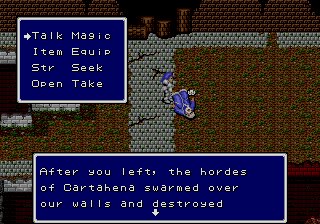 It’s pretty clear that Sega tossed most of its development cash and effort down the throats of those twin demons called Graphics and Sound, leaving bare-bones gameplay and a ridiculously boring story. Indeed, Sword of Vermillion has found its way to more than a few lists of infamy thanks to its inability to meet expectations and general laziness. No one’s griping about the music, though, and thanks to some truly spectacular scoring there’s still reason to play this game. (Or at least use the sound test.) The town themes – truly a high point – are bouncy and vibrant thanks to oom-pah-pah rhythms and sparklingly crisp melodies; the dungeon music is suitably contemplative and even mournful. This is the sort of thing that had gamers everywhere pulling out their cassette decks, and even today there’s more than enough reason to obtain the soundtrack for a thorough listen.
It’s pretty clear that Sega tossed most of its development cash and effort down the throats of those twin demons called Graphics and Sound, leaving bare-bones gameplay and a ridiculously boring story. Indeed, Sword of Vermillion has found its way to more than a few lists of infamy thanks to its inability to meet expectations and general laziness. No one’s griping about the music, though, and thanks to some truly spectacular scoring there’s still reason to play this game. (Or at least use the sound test.) The town themes – truly a high point – are bouncy and vibrant thanks to oom-pah-pah rhythms and sparklingly crisp melodies; the dungeon music is suitably contemplative and even mournful. This is the sort of thing that had gamers everywhere pulling out their cassette decks, and even today there’s more than enough reason to obtain the soundtrack for a thorough listen.
Tracks to check out: Statts, Last City.
Wonder Boy in Monster World
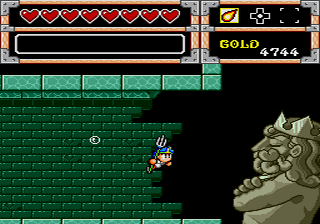 In case you haven’t gotten the idea yet, it’s extremely important that the tracks in a game’s score fit the environments they’re assigned to. The most brilliant composition in the world is wasted if it doesn’t match the tone of the level. There’s nothing to worry about here, though, because the songs in Wonder Boy in Monster World fit their areas like a kid glove, flawlessly adhering to the graphics and stories unfolding before you. And each of the tracks also fits the overall presentation of the game itself – uncomplicated and charming. Again, we see that pushing the hardware’s power is not always vital in the production of a good soundtrack. Wonderboy scores a variety of levels and situations with nothing more than the digital equivalent of toy drums, penny whistles, and a miniature piano. It’s that ability to convey aural expressions so vividly and simply that puts this soundtrack on our list of greats, not to mention all the catchy melodies.
In case you haven’t gotten the idea yet, it’s extremely important that the tracks in a game’s score fit the environments they’re assigned to. The most brilliant composition in the world is wasted if it doesn’t match the tone of the level. There’s nothing to worry about here, though, because the songs in Wonder Boy in Monster World fit their areas like a kid glove, flawlessly adhering to the graphics and stories unfolding before you. And each of the tracks also fits the overall presentation of the game itself – uncomplicated and charming. Again, we see that pushing the hardware’s power is not always vital in the production of a good soundtrack. Wonderboy scores a variety of levels and situations with nothing more than the digital equivalent of toy drums, penny whistles, and a miniature piano. It’s that ability to convey aural expressions so vividly and simply that puts this soundtrack on our list of greats, not to mention all the catchy melodies.
Tracks to check out: Not Available.

Recent Comments